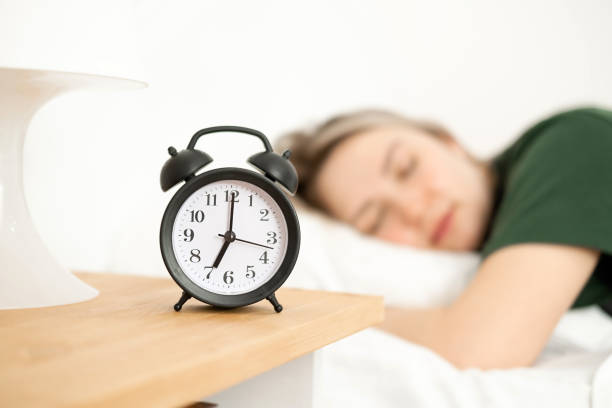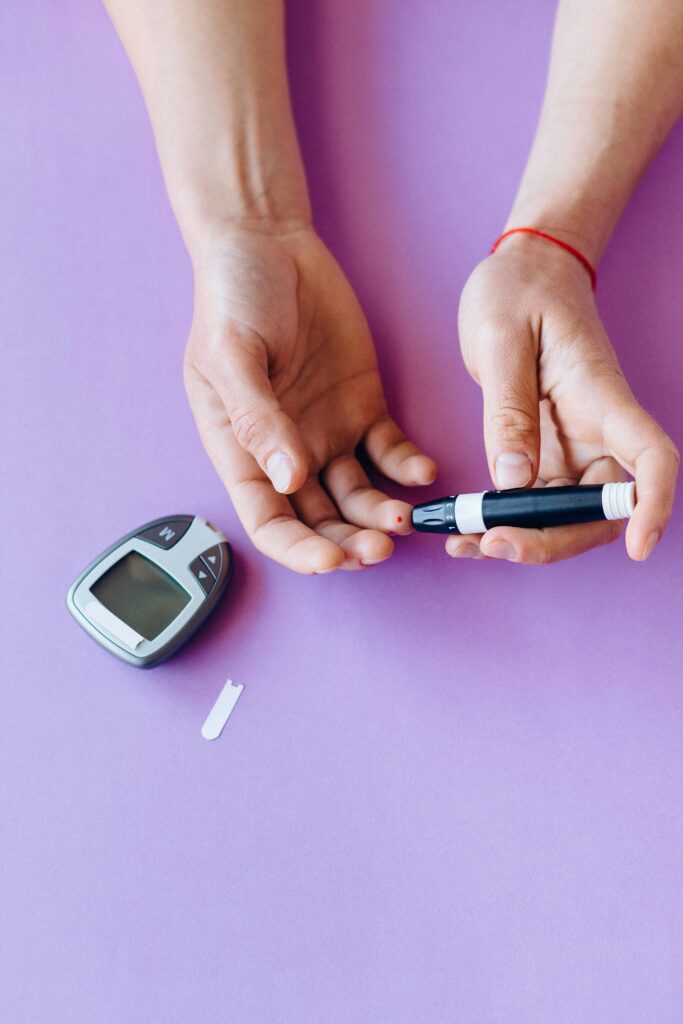Learn more about sleep and blood sugar management with insights from Dietitian and Diabetes Educator: SaRene Brooks RDN, LD, CDCES
Did you know that getting enough sleep plays a powerful role in managing blood sugar levels? The relationship between sleep and blood sugar is complex, but one thing is clear — adequate, quality sleep is essential for good health. In this article, we’ll explore how sleep impacts insulin sensitivity, how your body’s circadian rhythm affects blood sugar control, and how developing healthy sleep habits can support better overall wellness.
The link of sleep and blood sugar control

Lack of sleep can have a surprising impact on how your body manages glucose. Poor sleep and insulin resistance go hand in hand — when you don’t get enough rest, your cells become less sensitive to insulin, the hormone that helps move glucose out of the bloodstream and into your cells for energy. As a result, blood sugar levels rise. This is a common feature that can complicate management of type 1 and type 2 diabetes. It also impacts people without diabetes.
For those already living with diabetes, blood sugar levels naturally rise in the early morning hours, a pattern known as the Dawn Phenomenon. When combined with reduced insulin effectiveness from lack of sleep, this can make morning blood sugars even harder to manage.
Lack of sleep can increase cortisol levels. When we don’t get adequate sleep, our bodies go into a state of chronic stress. Cortisol production is part of the stress response.
Cortisol also plays a role in insulin resistance in the following ways:
- Decreased uptake of glucose from the bloodstream to be used by the cells of the body for energy
- Increased production of glucose by the liver causing blood sugars to rise
- Suppression of insulin release from the pancreas causing blood sugars to rise.
With these three things combined, blood sugars can rise and complicate efforts to manage glucose levels.
When you don’t get adequate sleep, important changes occur in your hunger hormones (leptin and ghrelin).
- Over-production of Ghrelin – appetite increasing hormone
- Under-production of Leptin – appetite suppressing hormone
As you can see, this change in hormone production interferes with the urge to eat more and the inability to recognize fullness.
Because of this, there is a connection between lack of sleep and cravings, especially for quick sources of energy like processed carbohydrates. As a result, people are more likely to overeat or turn to late-night snacking, making it harder to maintain stable blood sugar. On the other hand, getting adequate, restorative sleep supports insulin sensitivity, helps stabilize blood sugar, and promotes balanced hunger cues, making it easier to maintain healthy eating habits and steady energy throughout the day.
Circadian Rhythm: Your Body’s Internal Clock

Your circadian rhythm is your body’s internal 24-hour clock that regulates sleep, metabolism, and hormone production — including those that control blood sugar. This natural rhythm helps your body know when to rest, eat, and use energy efficiently. When your sleep schedule is irregular — such as staying up late, sleeping in on weekends, or working night shifts — it can throw this rhythm off balance. As a result, your body may release more glucose into the bloodstream and become less sensitive to insulin, leading to higher blood sugar levels. This can make a negative impact on blood sugar management for those living with diabetes. For those who are not, it puts them at a higher risk for developing type 2 diabetes. To support a healthy circadian rhythm, aim to go to bed and wake up at consistent times each day, get exposure to natural daylight in the morning, and limit screen time before bed to help your body recognize when it’s time to wind down. By protecting your circadian rhythm and getting consistent, restorative rest, you give your body the chance to regulate glucose more effectively.
Time of Day for Sleep: Why Sleep Timing Matters
When it comes to blood sugar control, when you sleep can be just as important as how long you sleep. Your body’s metabolism follows a natural rhythm that’s closely tied to the light-dark cycle of the day.

Sleeping at night — when your circadian rhythm expects rest — supports balanced hormone production, efficient insulin use, and stable blood sugar levels. In contrast, sleeping during the day or keeping an inconsistent schedule can disrupt this rhythm, making it harder for your body to regulate glucose effectively. Whenever possible, try to align your sleep with the natural daylight cycle by going to bed and waking up around the same time each day. This consistency helps reinforce your internal clock, promoting better sleep quality and more predictable blood sugar patterns.
Quality vs Quantity of Sleep

When it comes to healthy sleep, quality sleep vs. quantity is just as important as the number of hours spent in bed. Sleep quantity measures the total time you spend sleeping, while quality determines how restorative your sleep is—how refreshed and energized you feel upon waking. Restorative sleep occurs when your sleep is continuous, you fall asleep easily, and your body cycles properly through deep and REM stages. Even if you spend enough hours in bed, poor-quality sleep can leave you feeling unrested and negatively impact your mood, cognitive function, and overall health. Poor quality of sleep can negatively impact blood glucose by increasing insulin resistance and disrupting the hormones that regulate appetite ana stress. Prioritizing both sleep quantity and quality ensures that your body and mind get the full benefits of rest.
Below are the recommended amounts of sleep by age to support optimal health and restorative sleep:
- Infants (0–12 months): 14–17 hours per day (including naps)
- Toddlers (1–2 years): 11–14 hours per day (including naps)
- Preschoolers (3–5 years): 10–13 hours per day
- School-age children (6–12 years): 9–12 hours per night
- Teenagers (13–18 years): 8–10 hours per night
- Adults (18–64 years): 7–9 hours per night
- Older adults (65+ years): 7–8 hours per night
By focusing on both restorative sleep and sufficient sleep duration, you can support energy, cognitive performance, and overall well-being.
How Blood Glucose Impacts Sleep

Just as sleep can influence blood sugar levels, blood sugar levels can also affect the quality of your sleep. When blood glucose runs high, it can disrupt rest by causing frequent urination, increased thirst, dehydration, and sensations of warmth or irritability that make it harder to stay asleep. Elevated glucose levels may also interfere with the nervous system, raise stress hormones such as cortisol, and alter the brain’s production of key sleep-regulating chemicals like melatonin and serotonin. Over time, these effects can contribute to insomnia, restless nights, and fragmented sleep, creating a cycle that makes both blood sugar management and restorative rest more difficult.
Conclusion: Prioritize Sleep for Better Blood Sugar Control
Sleep plays a vital role in blood sugar control, influencing everything from how your body uses insulin to how well you manage cravings and energy throughout the day. Your circadian rhythm, or internal body clock, helps regulate these processes by signaling when to rest and when to be active. Disruptions to this rhythm — such as inconsistent sleep schedules or sleeping during the day — can make it harder to maintain stable glucose levels. Likewise, both the timing of your sleep and the quality versus quantity of rest you get are equally important. Aiming for consistent, high-quality sleep that aligns with your natural circadian rhythm supports balanced hormones, better insulin sensitivity, and overall metabolic health. The good news is that by prioritizing good sleep habits, you’re not just improving rest — you’re taking an essential step toward better blood sugar management and long-term wellness.
Try these TIPS:
- Establish a consistent sleep schedule and stick to it, even on weekends.
- Do something relaxing at bedtime such as taking a warm bath, reading, or listening to calming music.
- Keep your bedroom dark, quiet, and at a comfortable, cool temperature.
- Avoid caffeine and alcohol within 6 hours of bedtime.
- Limit daytime naps, especially after 3 pm.
- Develop a regular exercise routine.
- Avoid heavy meals or sugary drinks before sleep.
- Reduce exposure to light from electronic devices in the evening.
- Invest in a comfortable mattress and pillow.
- If you wake up frequently, try returning to sleep without leaving the bed if possible.

Schedule with SaRene!
SaRene Brooks, RDN, CDCES, is a dietitian and diabetes educator passionate about helping families thrive with type 1 diabetes. As a mom of three—two with T1D—she blends professional expertise with personal insight, offering guidance on diabetes care, nutrition, weight management, and wellness. SaRene is also a wife of an avid outdoorsman, grandma, creative cook, and educator dedicated to helping people reach their health goals.

